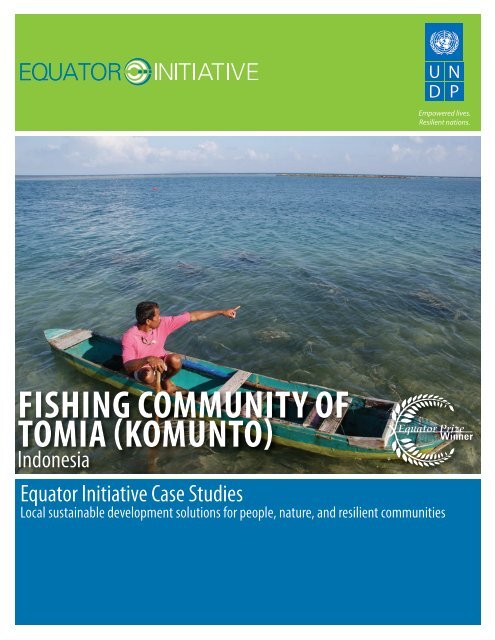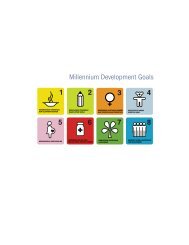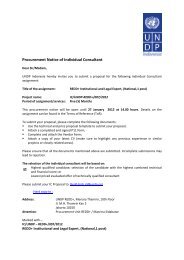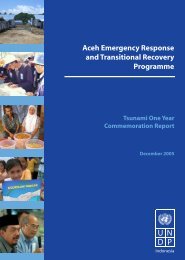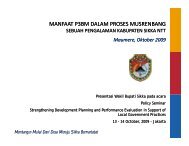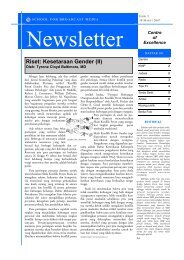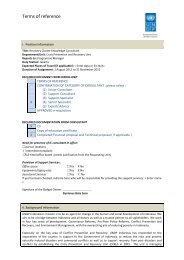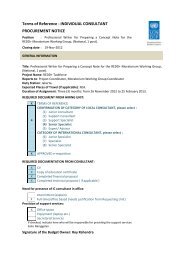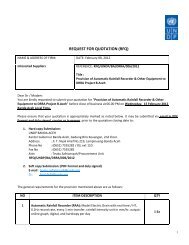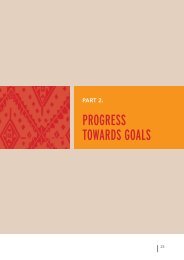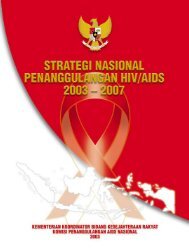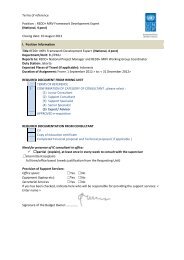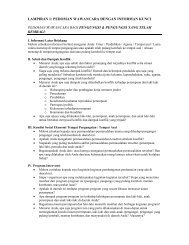FISHING COMMUNITY OF TOMIA (KOMUNTO) - UNDP
FISHING COMMUNITY OF TOMIA (KOMUNTO) - UNDP
FISHING COMMUNITY OF TOMIA (KOMUNTO) - UNDP
Create successful ePaper yourself
Turn your PDF publications into a flip-book with our unique Google optimized e-Paper software.
Empowered lives.Resilient nations.<strong>FISHING</strong> <strong>COMMUNITY</strong> <strong>OF</strong><strong>TOMIA</strong> (<strong>KOMUNTO</strong>)IndonesiaEquator Initiative Case StudiesLocal sustainable development solutions for people, nature, and resilient communities
<strong>UNDP</strong> EQUATOR INITIATIVE CASE STUDY SERIESLocal and indigenous communities across the world are advancing innovative sustainable development solutions that workfor people and for nature. Few publications or case studies tell the full story of how such initiatives evolve, the breadth oftheir impacts, or how they change over time. Fewer still have undertaken to tell these stories with community practitionersthemselves guiding the narrative.To mark its 10-year anniversary, the Equator Initiative aims to fill this gap. The following case study is one in a growing seriesthat details the work of Equator Prize winners – vetted and peer-reviewed best practices in community-based environmentalconservation and sustainable livelihoods. These cases are intended to inspire the policy dialogue needed to take local successto scale, to improve the global knowledge base on local environment and development solutions, and to serve as models forreplication. Case studies are best viewed and understood with reference to ‘The Power of Local Action: Lessons from 10 Years ofthe Equator Prize’, a compendium of lessons learned and policy guidance that draws from the case material.Click on the map to visit the Equator Initiative’s searchable case study database.EditorsEditor-in-Chief:Managing Editor:Contributing Editors:Joseph CorcoranOliver HughesDearbhla Keegan, Matthew Konsa, Erin Lewis, Whitney WildingContributing WritersEdayatu Abieodun Lamptey, Erin Atwell, Toni Blackman, Jonathan Clay, Joseph Corcoran, Larissa Currado, Sarah Gordon, Oliver Hughes,Wen-Juan Jiang, Sonal Kanabar, Dearbhla Keegan, Matthew Konsa, Rachael Lader, Patrick Lee, Erin Lewis, Jona Liebl, Mengning Ma,Mary McGraw, Gabriele Orlandi, Juliana Quaresma, Peter Schecter, Martin Sommerschuh, Whitney Wilding, Luna WuDesignOliver Hughes, Dearbhla Keegan, Matthew Konsa, Kimberly Koserowski, Erin LewisAcknowledgementsThe Equator Initiative acknowledges with gratitude the Fishing Community of Tomia (<strong>KOMUNTO</strong>), and in particular the guidance andinputs of Saharuddin Usmi. All photo credits courtesy of <strong>KOMUNTO</strong>. Maps courtesy of CIA World Factbook and Wikipedia.Suggested CitationUnited Nations Development Programme. 2012. Fishing Community of Tomia (<strong>KOMUNTO</strong>), Indonesia. Equator Initiative Case Study Series.New York, NY.
<strong>FISHING</strong> <strong>COMMUNITY</strong> <strong>OF</strong> <strong>TOMIA</strong>(<strong>KOMUNTO</strong>)IndonesiaPROJECT SUMMARYThe Fishing Community of Tomia is a community-basedorganization composed of representatives of fishers’groups from East Tomia, Indonesia. The organization wasestablished in response to shared community concernsregarding foreign commercial fishing, the use of destructivefishing methods, and a vacuum in local governmentleadership on the sustainable management of Wakatobinatural resources.The initiative encourages the local management ofnatural resources to improve community wellbeing. It haspromoted local participation in zoning and spatial planningof Wakatobi National Park, and established three protectedareas around the island of Tomia to allow fish stocks toregenerate. Financial contribution from members fundsavings and loan services and support for members with intimes of need.KEY FACTSEQUATOR PRIZE WINNER: 2010FOUNDED: 2006LOCATION: Tomia, Wakatobi ArchipelagoBENEFICIARIES: 18 fishers’ groupsBIODIVERSITY: No-take zones, sustainable fishing methodsTABLE <strong>OF</strong> CONTENTSBackground and Context 4Key Activities and Innovations 5Biodiversity Impacts 6Socioeconomic Impacts 6Policy Impacts 7Sustainability 8Replication 8Partners 83
Background and Context<strong>KOMUNTO</strong> evolved organically from a series of small self-help groupswhich had formed in order to address specific challenges or, in manycases, to coordinate activities around a common fishing method(e.g. hook-and-line, trap, fish aggregation, trawl net, seaweed farmingand more). The groups quickly became agents of innovation intheir respective villages and, in time, united under the <strong>KOMUNTO</strong>umbrella. The approach today remains the same, with members encouragingtheir respective communities to work together to identifychallenges to sustainable fishing and to develop viable community-basedsolutions. Certain challenges are common to a number ofcommunities, and include decreased catch, coral bleaching, unstablefish prices, lack of business capital, insufficient engagement bythe local government, and financial challenges.The Wakatobi archipelago is located just south-east of Sulawesi Islandin Indonesia. It sits at the centre of the coral triangle, which issaid to hold the highest diversity of coral, fish, mollusks and marineplant species in the world. Wakatobi is an acronym, formed of thenames of four major islands – Wangi-wangi, Kaledupa, Tomia andBinongko – though the area contains a total of 39 islands and severallarge atolls. The islands also fall within Wakatobi National Park,a World Heritage site and home to unique marine biodiversity. Thefour main islands are surrounded by fringing coral reefs and largeatolls. Wakatobi National Park is also surrounded by straits that functionas important migratory corridors for large marine species suchas sea turtles and whales, many of which are listed as endangered.The resident population of over 100,000 people living within theboundaries of Wakatobi National Park exerts substantial pressureon local marine resources. Competition for resources has resulted indestructive fishing practices and overfishing. Dynamite fishing andthe use of cyanide are widespread and have steadily degraded thereefs. There is also an absence of coordinated enforcement of fishingregulations and traditional fishing rights, leaving the area open tofishers from Java-Madura, Sulawesi, and Bali-Lombok.The Fishing Community of Tomia (Komunitas Nelayan Tomia - KO-MUNTO) is an independent, community-based organization whichaims to encourage the sovereign and sustainable management ofnatural resources to improve the wellbeing of its members. The organizationevolved in response to shared community concerns regardingthe incursion of foreign actors into territory under the stewardshipof traditional fisherman, the proliferation of destructive fishingmethods (including dynamite fishing and the use of poisons), and ageneral lack of clarity and coordination regarding the managementof Wakatobi’s natural resources, particularly at the local governmentlevel.Collective action to address local challengesThe initiative began in 2006 with the establishment of three ‘fishbanks’ in the waters close to Onemay and Waha villages. The fishbanks functioned as traditional use zones, which were closely managedby the communities and relevant authorities to monitor limitationson extractive activities.<strong>KOMUNTO</strong> is a product of community activism and leadership. Earlyarchitects of the program included community organizers in Tomio(eight representatives of the Wakatobi Stakeholders’ Forum); elevenrepresentatives from Potau-tau, Asahitira’a, Hasil Karya, Poassato,Surya Samudera, Para-para, Bugar, Cahaya Rahmat, Sinar Huuntete,Jibu-jibu, and La Koma; and two local facilitators from The NatureConservancy-World Wildlife Fund for Nature Joint Program.<strong>KOMUNTO</strong> is designed to give a voice to local communities, and tomake constructive connections between community fishers andrelevant government stakeholders. By facilitating information exchangeand ongoing dialogue, <strong>KOMUNTO</strong> aims to inform policymakingin a manner that is responsive to local needs. <strong>KOMUNTO</strong>aligns and coordinates its activities with the Wakatobi National ParkAuthority, the District Fisheries and Marine Affairs Office, and TheNature Conservancy-World Wildlife Fund Wakatobi Joint Program.In total, <strong>KOMUNTO</strong> brings together 18 fishers’ groups. The organizationis governed by a management team of 38 people. The executiveconsists of a Coordinator, a Secretary and a Treasurer. The group alsohas individual managers of 35 different work units, which include,for example a community organizing unit, a natural resources managementadvocacy unit, a capacity building unit, an informationdevelopment and research unit, an economy unit, and a women’sempowerment unit.Managers are not remunerated, and often voluntarily contributefunds or other practical support to convene meetings and advancethe organization. Should managers be employed by other organizations,they are encouraged to contribute no less than two per cent oftheir earnings to <strong>KOMUNTO</strong>. Decision-making is done in a participatorymanner with all members encouraged to make contributions.Each work unit is given the flexibility to plan and create work plansthat are evaluated by the whole organization. The Coordinator overseesthe overall operations and maintains responsibility for forgingrelationships with the government and with other like-minded organizationscommitted to conservation and sustainable livelihoods.4
Key Activities and InnovationsOne of the binding elements of <strong>KOMUNTO</strong> as an organization is ashared commitment to finding solutions that work both for localfishers and for local ecosystems. The two, in fact, are inseparable, aslocal fishers depend on the long-term sustainability of marine resourcesfor their livelihoods, health, food security and wellbeing.Information exchange and capacity buildingThe organization’s key activities are undertaken in the areas of informationexchange and capacity building. <strong>KOMUNTO</strong> focuses agreat deal of energy on community mobilization in order to expandits outreach for environmental education and thereby increase thenumber of local fishers engaging in sustainable fishing practices.Beyond awareness-raising activities, <strong>KOMUNTO</strong> works to build localcapacity through training and workshops. Specific interventionshave included social analysis to gauge potential stakeholder interestin community-based initiatives, the use of low-impact fishing techniquesand equipment, cooperative development, business managementand bookkeeping, participatory video, and village mapping.The latter has been essential in developing a common spatialawareness amongst local stakeholders of areas that fall under traditionalresource management systems. Importantly, <strong>KOMUNTO</strong> hasdeveloped a learning and knowledge exchange complex called the<strong>KOMUNTO</strong> ‘House of Learning’. This resource centre is designed tohost dialogues between fishers’ self-help groups and is equipped tohost and accommodate visiting fishers from other islands in WakatobiNational Park.and traditional resource management systems, <strong>KOMUNTO</strong> has alsoused modern science and technology effectively, particularly in thepromotion of knowledge exchange. The organization has partneredwith radio broadcasters to tailor programming on sustainable fishingto children, teenagers and adults. Programs are aired in local languagesand in Bahasa. <strong>KOMUNTO</strong> has also used digital and videocameras to document the challenges of communities in one region,to share with communities in other regions. They have also produceda number of documentary films, including the widely viewed ThreeDays with the Mayor (Tiga Hari Bersama masyarakat Wali), Journeyto Binongko (Perjalanan Menuju Binongko) and Three Days with Nadine(Tiga hari bersama Nadine) among others. Relationships withmedia organizations have been established to communicate commonchallenges and solutions in sustainable fishing through newscastsand print journalism.Conservation and regulationTwo other important activity areas have been the establishment of‘fish banks’ and a fishing boat registration system, both of which areresponses to the incursion of foreign fishers into traditional waters.Fish banks are essentially no-take zones, which are closely monitoredthrough community leadership but with the support of localauthorities. Areas where the reef has been comparatively over-fishedor degraded are selected as taboo, and no fishing is allowed, in orderto let the marine ecosystem regenerate. In a process overseen by KO-MUNTO, self-help groups have established fish banks in the watersnear Waha, Onemay, Desa Timu, Desa Kulati, Desa Kollosoha, andDesa Patua. Monitoring of the taboo areas is complemented by aparallel initiative to register fishing boats in the region. In collaborationwith a number of organizations, <strong>KOMUNTO</strong> has used this systemto track the number and origin of fishers in local waters. It is difficultto implement no-take policies and other community-based naturalresource management plans without an accurate overview of who isaccessing the fishing ground and, importantly, who is transgressing.Fishing boat registration is designed to deal with issues of regulatorycompliance and to serve as a deterrent to outside fishers.One noteworthy innovation has been the creative use of technologyin its activities. While emphasizing the value of local knowledge5
ImpactsBIODIVERSITY IMPACTS<strong>KOMUNTO</strong> has actively promoted environmental education in theregion, and leverages its resources and partnerships to encouragethe uptake of more sustainable and environmentally responsiblefishing techniques. Environmental education has, in turn, createdand fostered a shared sense of purpose to finding sustainable developmentsolutions. In 2008, all 27 member groups of <strong>KOMUNTO</strong>– a total of 418 families – drafted and signed a declaration outliningtheir shared commitment to sustainable fishing practices and rejectingthe use of techniques involving explosives and sedatives.Importantly, <strong>KOMUNTO</strong> has been instrumental in designing a revisedzoning system for Wakatobi National Park. The plan delimitsdifferent use zones within the park. Specifically, <strong>KOMUNTO</strong> was integralin identifying traditional use areas and fish aggregation sitesin need of protection. Special attention was given to the protectionof fish spawning sites and the demarcation of different zones forusers with different needs (e.g. traditional and local fishers, outsidefishers, regeneration sites etc.). <strong>KOMUNTO</strong> was successful at infusingthe zoning system – what is now the basis of sustainable fisheriesmanagement in the park – with provisions that were respectfulof traditional fishing rights, as well as considerations for managingcompetition, extraction levels, and for the appropriate use of moderntechnologies.Voluntary restrictionsThe introduction of fish banks has been an effective mechanism ofensuring conservation and sustainability. The pioneers of the fishbank approach were three self-help groups in Tomia (Potau-tau,Para-para and Lakomai). The fishers there collectively reached anagreement to abstain from fishing in these areas, effectively establishingno-take zones where damaged or degraded marine resourcescould regenerate. Additionally, the self-help groups involvedagreed to monitor and protect these no-take zones from destructivefishing practices and to report any illegal fishing to the park authority.The strategy has proven beneficial, as fish catches improved andstabilized. The fishers also observed the return of fish species suchas tuna, barracuda and trevally, which were not present for severalyears.The success demonstrated in Tomia had a domino effect acrossWakatobi National Park. Other local fishers and self-help groupshave adopted similar no-take zones and have been rewarded withequally positive results in terms of catch sizes and biodiversity. Thereare no sanctions applied in the case of transgression of regulationsset within the fish banks. Compliance is entirely voluntary, basedon a shared and cultivated understanding between fishers that, ifmembers break the rules, there will no longer be enough fish to providefor local food security and livelihoods. It is then social capital,education and trust that sustain the taboo model. The fishers’ direct6
experience of the benefits that conservation can bring, for examplein the form of increased incomes, provides further incentive for compliancewith the restrictions.Across the fish banks, local fishers report new and rejuvenated populationsof snapper, grouper, dogtooth tuna, and sea urchins. Thereturn of sea urchins is particularly promising as they had previouslybeen overharvested. The model of collective action has spilled overinto other sectors, with self-help groups forming to address mangroveconservation and reforestation – another pressing challengeconfronting the region.SOCIOECONOMIC IMPACTS<strong>KOMUNTO</strong> membership is based on shared responsibilities andshared benefits. Group members participate in the financial managementof the organization through a three-tiered savings system:main savings, voluntary savings and compulsory monthly fees. Notonly do the various savings enable the organization to continueoperating, but members can access funds for a range of conservationand sustainable livelihoods needs. Drawing from this rotatingfund, a number of members have launched small-scale businessesto supplement income from fishing. Some examples have includeda savings and loan rice business, a mobile fish sales business, and asavings and loan diesel business.To support and strengthen small-scale business launched with fundsfrom <strong>KOMUNTO</strong> savings, members prioritize buying goods fromother member groups rather than with outside communities, therebyensuring a predictable and stable market for locally producedproducts. Funds are also made available for local investment needsin education, healthcare and community development projects.In addition to improved livelihoods from increased catch sizes, anddiversified income streams from small-scale businesses, fishers havebenefited from training in mariculture. <strong>KOMUNTO</strong> has developedfish mariculture programs which can be carried out directly withinnatural ecosystems, such as seaweed farming and grouper and troutfarming in floating cages.Knowledge sharing activities have also been created specifically forwomen, for example, in peer-to-peer training on the production ofabon, a popular local condiment made of fried, shredded fish.POLICY IMPACTS<strong>KOMUNTO</strong> played a key role in revising the zoning and spatial planningsystems in Wakatobi National Park. This was the first time thata zoning system in Indonesia’s National Parks was agreed upon byconsensus between national and local government and local communities.As <strong>KOMUNTO</strong> remains involved in this evolving process,its members voices are taken into consideration and they remain informedof changes and opportunities for input.At the village level, <strong>KOMUNTO</strong> members are given responsibility forthe coordination of their respective groups. Each group is affordedthe opportunity to create a work plan, which is then evaluated bythe larger organization. Informed by these work plans, <strong>KOMUNTO</strong>participates in village discussion commissions and works to incorporatethe perspectives and needs of traditional fishers into villagemanagement plans and resource management strategies.7
Sustainability and ReplicationSUSTAINABILITYThe heart of <strong>KOMUNTO</strong>’s sustainability is quite literally communitybuy-in. <strong>KOMUNTO</strong> members contribute financially to three separatefunds that sustain the program: a main savings fund, a voluntarysavings fund and compulsory monthly fees. Members are alsoencouraged to make contributions of materials, time and ideas.Management members contribute two per cent of their salary to<strong>KOMUNTO</strong> if they are employed by another organization. Membersthat participate in capacity building programs conducted andpaid for by another organization are responsible for contributingthree per cent of revenues. Through this model of shared financialresponsibility, <strong>KOMUNTO</strong> has effectively created a cooperativemodel which maintains a rotating fund available to its members forsavings and loan services. This fund is most frequently tapped tosupport trade activity needs.<strong>KOMUNTO</strong> still faces a number of challenges to its program modeland, therefore, to its long-term sustainability. The <strong>KOMUNTO</strong> modelis founded on trust, as well as local confidence in the cost-benefitbalance of short-term losses for long-term gains. This can take time tocultivate and requires patience, which is not always forthcoming. Atthe same time, there are limits to what can be accomplished throughvolunteerism. In order to expand capacity building activities, and tocontinue enlisting new fishers in the program, <strong>KOMUNTO</strong> needslong-term financial support and new resources. In addition, whilebroadcasting activities have been highly effective at reaching awider audience there is room for growth in the coordination andcooperative management of the two community radio stations anda need for harmonization of their long-term work plans.In some cases, sustainability challenges are beyond the controlof <strong>KOMUNTO</strong>, with external conditions dictating what is possibleand what is not. The national government, for instance, has yet torecognize or show an interest in the initiative. At the local level,government authorities have been mixed in their response toand support for <strong>KOMUNTO</strong>, at best, tolerating their work, and atworst, actively undermining it. This ambivalence and occasionalinterference extends to the local police force as well, who representa potential partnership of great value to <strong>KOMUNTO</strong>’s work.REPLICATION<strong>KOMUNTO</strong> began as an alliance of five fishers’ self-help groups. Infour years, its membership has grown by more over 400 per cent,and it now coordinates 18 fishers’ groups. The membership base isprojected to grown even larger in the coming years. This growthsimultaneously indicates the demand from local communities forsustainable livelihood options, and illustrates the transferability ofthe project model.The long-term vision of <strong>KOMUNTO</strong> is to expand sustainable fishingoperations to the three surrounding islands of Wangi-Wangi,Kaledupa and Binongko. This was one of the many motivatingfactors behind the construction of the <strong>KOMUNTO</strong> House of Learningcomplex – to facilitate knowledge sharing and the exchange oflessons learned between traditional fishers.The initiative’s community radio station, Radio Komunitas was laterreplicated with the establishment of Talombo FM in Onemay Villageand Onituloua FM in Timu Village.PARTNERS<strong>KOMUNTO</strong> has forged partnerships with groups that are equallycommitted to sustainable fishing and marine biodiversityconservation in Wakatobi National Park. Two of the most importantpartners in their work have been The Nature Conservancy-WorldwideFund for Nature Wakatobi Joint Program and the Wakatobi NationalPark Office (Balai Taman Nasional Wakatobi - BTNW). The initiativehas also built partnerships with other Wakatobi communityorganizations from Kaledupa, southern Wangi-Wangi and Binongkoto advocate for traditional fishing zones.The TNC-WWF Wakatobi Joint Program has been actively involved ina number of <strong>KOMUNTO</strong> projects, including: conducting a Wakatobifisheries feasibility study; facilitating revision of the WakatobiNational Park zoning system; producing a documentary film onenvironmental challenges in the region; providing managementtraining on marine resource management; providing scuba divingtraining for marine resource monitoring and evaluation; supportingresource mapping for village development planning; cooperating inthe management of pelagic fisheries; and implementing awarenessraisingcampaigns on natural resource management in and aroundmarine protected areas.Other important partners have included: the Coral Reef Rehabilitationand Management Program (COREMAP), FORKANI Kaledupa,POSA’ASA Wangi-Wangi, FONEB, LESTARI, and the CanadianInternational Development Agency (CIDA). These partners havehelped in the identification and registration of local fishing vessels,advocating for traditional fishing areas, and providing trainingin communications writing for news and journalism advocacy.<strong>KOMUNTO</strong> has also worked with the Wakatobi District Governmenton a series of public service announcements targeting a number ofstakeholders in the fishing sector.One particularly noteworthy partnership has been the developmentof two community radio stations. <strong>KOMUNTO</strong> partnered with YARI(Yayasan Bahari), WWF-Kendari, TNC-WWF, LESTARI and CIDA todevelop a community radio station, Radio Komunitas. The goal was anorganized media tool for local fishers, which would broadcast usefulinformation to a widely dispersed and marginalized population.This vision was not only realized, but was later replicated theestablishment of other community radio stations in neighbouringvillages.8
FURTHER REFERENCE• <strong>KOMUNTO</strong> PhotoStory (Vimeo) http://vimeo.com/15745899• Reef Resilience Fish Spawning Aggregations Case Study: http://www.reefresilience.org/Toolkit_FSA/F8_Wakatobi.htmlClick the thumbnails below to read more case studies like this:Equator InitiativeEnvironment and Energy GroupUnited Nations Development Programme (<strong>UNDP</strong>)304 East 45th Street, 6th FloorNew York, NY 10017Tel: +1 212 906-6691Fax: +1 212 906-6642www.equatorinitiative.orgThe United Nations Development Programme (<strong>UNDP</strong>) is the UN’s global development network, advocating for change and connectingcountries to knowledge, experience and resources to help people build a better life.The Equator Initiative brings together the United Nations, governments, civil society, businesses and grassroots organizationsto recognize and advance local sustainable development solutions for people, nature and resilient communities.©2012 by Equator InitiativeAll rights reserved


